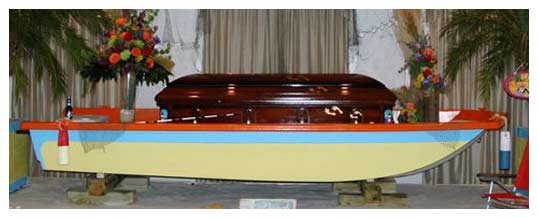Today’s clients have a whole new set of expectations for funerals. As a result, funeral home directors are being prompted to think outside the box. One critical area that needs adjusting is the funeral service itself.
Continuing to promote traditional funeral services will only allow you to appeal to a shrinking segment of your potential clients. These are people who are comfortable with traditional views on death and dying, who feel obligated to maintain their family’s expectations, or who believe that funerals should only focus on mourning the loss. There are, however, a growing number of people today who want funerals to mean more and to do more. They want funerals to meet personal and emotional needs that were previously ignored or not considered part of the funeral experience.
New emphasis is placed today on remembering and celebrating the life and loves of the deceased. These funeral services provide a fresh approach that incorporates reminders of the deceased’s lifestyle, hobbies, favorite activities, songs and even dances. Attendees are encouraged to participate in actual celebratory activities and events that highlight the things that made their loved one happiest.
There are many surprising ways for families to celebrate during a funeral—which in and of itself seems like a contradiction in terms. But within the parameters of these modern funeral services, families are encouraged to use their imagination to come up with tangible expressions of the fond memories they have of their loved one. Those attending the funeral are given opportunities to add their memories in the form of photos, treasured objects, and written thoughts to help fill scrapbooks, decorative boxes or framed, “write-on” memory boards. Markers, glue, dried flowers and other art supplies are provided right there in the room so that everyone can add something. Favorite foods are served and favorite songs shared, along with home movies or snippets of the loved one’s favorite films. Participants laugh and cry together. The mood is less formal and more relaxed, allowing everyone to feel comfortable with showing emotion and not being embarrassed if tears are shed. For example, honoring a loved one who had a great sense of humor may include sharing his or her favorite jokes or pranks, or even having games for the attendees to enjoy playing. The last funeral I attended was for my brother-in-law, who was a golf fanatic. A practice putting set complete with a 3-foot green turf and hole was available for everyone to putt a golf ball with the loved one’s name stamped on it. They could take the ball home as a keepsake.
One important change for funerals is a new focus on educating those at the funeral on dealing with grieving and death. Too many people go through a funeral and suffer alone, thinking that what they are feeling is somehow wrong and that they should be feeling differently than they do. They end up burdened with unnecessary guilt and despair. The right place to talk about what grief is and how it feels is there during the funeral service. By offering a few guidelines during the service you will promote healthier grieving in everyone who attends. Even if you have already discussed this with the grieving family, there will be many other people attending the funeral who need to know that there is a range of emotions that accompany a death. They need to be made aware of how grief can affect them. If you are presenting the service, set aside a few minutes at some point during the service to talk to your grievers about this. If a pastor or priest is handling the service, speak to him or her ahead of time as to the importance of educating the attendees for the sake of their own grieving and healing.
The funeral service should not be the end-all of the grieving process. People often feel that once the funeral is over, everyone should just pick themselves up and get on with their lives. They understand that the family needs some more time to deal with it all, but they should be helped to understand that those outside the family need more time, too. Integrate “Aftercare” into your schedule if you haven’t already done so. Plan to do follow-up with the family, close friends, and anyone else who attended who might want to talk out their feelings. At the close of the funeral, have ushers give attendees a card with your website, email and Facebook addresses, your phone number and a brief note encouraging them to call or send you a message letting you know how they are doing. Of course, take the initiative to personally contact the family once a week for several weeks after the funeral.
People in today’s world are more eager to express their opinions about whatever is happening around them, be it in politics or the community or within their circle of friends. Funerals should be an extension of this trend. Otherwise, the funeral business will be left behind in the dust like the horse and buggy or silent movies. As you encourage your grieving families and friends to creatively express how they feel during the funeral and even afterwards through email and social media, you will be enabling them to heal.



